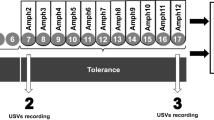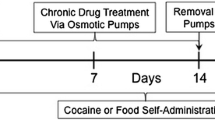Abstract
Rationale: Withdrawal from chronic amphetamine administration is characterized by deficits in reward that resemble some symptoms of depression. Nevertheless, the effects of long-term administration and withdrawal from other drugs, such as fluoxetine, that have the potential to elevate mood in depressed individuals have not been characterized. Objectives: The purpose of this study was to characterize the effects of withdrawal from chronic amphetamine or fluoxetine administration on central reward function. Furthermore, the effects of acute or chronic pretreatment with fluoxetine on responsiveness to an acute amphetamine challenge were examined to identify potential interactions between the two drugs. Methods: A rate-independent discrete-trial threshold procedure was used to characterize self-stimulation behavior in rats prepared with bipolar electrodes in the medial forebrain bundle. Results: Elevations in intracranial self-stimulation (ICSS) thresholds, reflecting a decrease in the reward value of the stimulation, were associated with withdrawal from various chronic amphetamine treatment regimens (1–5 mg/kg, three injections per day for 1, 2, 4 or 6 days). The magnitude and duration of threshold elevations were proportional to the duration and dose of amphetamine treatment prior to withdrawal. In contrast, no alterations in ICSS thresholds were associated with withdrawal from chronic fluoxetine treatment (5 mg/kg/day for 15 days). While neither acute nor chronic administration of fluoxetine alone altered ICSS thresholds, chronic pretreatment with fluoxetine blocked the threshold-lowering effect of acute amphetamine administration (4 mg/kg), but acute pretreatment did not. Amphetamine-induced decreases in response latency, a measure of motor performance, were not affected by either chronic or acute fluoxetine pretreatment. Conclusions: The results of these experiments suggest that chronic fluoxetine treatment may induce adaptive changes in serotonergic transmission that, in themselves, do not alter the function of central reward processes, but may alter the ability of amphetamine to potentiate ICSS reward. In addition, the lack of change in ICSS thresholds during withdrawal from the chronic fluoxetine treatment regimen used suggests that withdrawal from all mood-altering drugs may not necessarily produce changes in central reward functions.
Similar content being viewed by others
Author information
Authors and Affiliations
Additional information
Received: 10 September 1998 / Final version: 8 March 1999
Rights and permissions
About this article
Cite this article
Lin, D., Koob, G. & Markou, A. Differential effects of withdrawal from chronic amphetamine or fluoxetine administration on brain stimulation reward in the rat – interactions between the two drugs. Psychopharmacology 145, 283–294 (1999). https://doi.org/10.1007/s002130051060
Issue Date:
DOI: https://doi.org/10.1007/s002130051060




